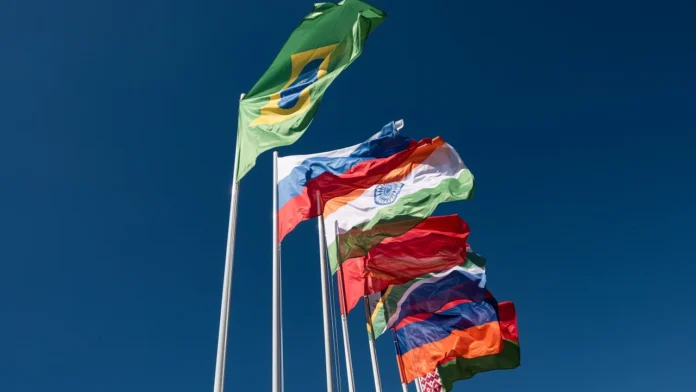Moscow Expects the 2024 BRICS Summit to Witness Significant Expansion of Participating Leaders
In a significant development that has captured the attention of the international community, Moscow has expressed its expectations for the upcoming 2024 BRICS summit. According to a high-ranking Russian diplomat, the number of leaders participating in the BRICS Summit is anticipated to surpass the current count of five. This comes as the five-member organization prepares to convene and discuss its enlargement at the pinnacle of this year’s event. With numerous nations already showing keen interest or formally applying for membership, the potential expansion of BRICS holds significant implications for global economics and geopolitics.
Russia’s Deputy Foreign Minister Signals Openness to New BRICS Members
Russia’s Deputy Foreign Minister, Sergey Ryabkov, conveyed the Russian government’s stance on the matter, affirming that the 2024 BRICS summit will not be limited to its current five members. As host of the summit and chair of the BRICS group of developing economies, Russia is taking a proactive stance in defining the parameters of the bloc’s expansion. Ryabkov stated that the number of participating heads of state is likely to exceed the existing five members, indicating the Russian Federation’s openness to admitting new member states to the organization.
BRICS Summit 2024: An Enlargement Discussion
The forthcoming BRICS summit, scheduled to take place from August 22nd to 24th in Johannesburg, South Africa, is poised to address the crucial topic of enlargement. Amidst this backdrop, several media reports and official statements have hinted at a growing interest from various countries in joining BRICS. The anticipation of an expanded membership has sparked intrigue and speculation across the globe.
Russian President Vladimir Putin’s Virtual Participation
One notable aspect of the upcoming summit is the virtual participation of Russian President Vladimir Putin. Due to an indictment and arrest warrant issued by the International Criminal Court (ICC) in relation to the war in Ukraine, President Putin will not attend the event in person. However, his active involvement via video link emphasizes the Russian leadership’s commitment and focus on the BRICS format. Ryabkov has clarified that this approach does not signal any decrease in attention to the organization; on the contrary, it underscores the leadership’s unwavering dedication to the bloc’s growth and development.
A Growing Interest in BRICS Membership
In recent months, both officials and media reports have shed light on the mounting interest from various countries seeking membership in BRICS. India’s Business Standard daily, for instance, has highlighted potential inductees such as Saudi Arabia, the United Arab Emirates, Indonesia, Egypt, and Argentina. South Africa’s Anil Sooklal, a key diplomat responsible for BRICS relations, has also confirmed that over 40 countries have expressed interest in joining the economic bloc. Among them, 22 nations have already formally applied for membership, showcasing the appeal and significance of BRICS on the global stage.
BRICS Enlargement: The Road Ahead
The potential expansion of BRICS raises intriguing questions about the future direction of the organization. While the current five-member group has already established itself as a formidable force in the global economic landscape, the addition of new members could unlock new opportunities and challenges. As more nations express interest in joining BRICS, the summit in Kazan holds the promise of reshaping the bloc’s dynamics and global influence.
The Impact of BRICS Expansion on Global Economics
The enlargement of BRICS could have profound implications for global economics. With the potential inclusion of diverse economies from different regions, the bloc’s collective strength and influence in the global market may witness a significant surge. The combined economic power of BRICS members already accounts for a substantial portion of the world’s GDP, and the addition of new members could further solidify its position as a driving force in international trade and commerce.
Geopolitical Significance of Expanding BRICS Membership
Beyond economic considerations, the expansion of BRICS also holds geopolitical significance. As the geopolitical landscape undergoes constant shifts, the inclusion of new member states could alter regional dynamics and influence international relations. BRICS has historically been an avenue for cooperation and collaboration among its members, and an enlarged bloc could amplify its voice on global platforms, enabling them to address shared challenges and goals more effectively.
Challenges and Opportunities
While the prospect of expanding BRICS membership brings exciting possibilities, it also presents a set of challenges that the organization must address. Among the potential hurdles are the varying economic and political contexts of prospective member states, the need for consensus-building among existing members, and the establishment of new frameworks for cooperation. However, the BRICS nations have displayed a commitment to multilateralism and the pursuit of common goals, which could serve as a solid foundation for navigating these challenges.
Public Opinions and Speculations
The anticipation of BRICS enlargement has not gone unnoticed by the public and various stakeholders. Across the globe, analysts, economists, and policymakers are closely monitoring developments, offering their perspectives on the potential impact of an expanded BRICS. As speculations continue to surface, the actual outcome of the enlargement discussion at the upcoming BRICS Summit remains uncertain but eagerly awaited.
Final Thoughts
The 2024 BRICS summit in Kazan, Russia, is shaping up to be a historic event, with the organization’s potential expansion taking center stage. The openness expressed by Russian Deputy Foreign Minister Sergey Ryabkov has fueled expectations of a larger group of leaders participating in the summit. As interest from numerous nations continues to grow, BRICS’ role in shaping global economics and geopolitics may witness a transformational shift. The path ahead is both promising and challenging, but the spirit of collaboration and mutual respect that underpins BRICS sets a positive tone for its future growth.
In conclusion, the 2024 BRICS summit holds the promise of charting a new course for the organization, with its potential expansion opening doors to fresh opportunities and horizons. The world will be watching as leaders convene in Kazan to define the future of this influential economic bloc.








[…] Moscow Expects the 2024 BRICS Summit to Witness Significant Expansion of Participating Leaders […]